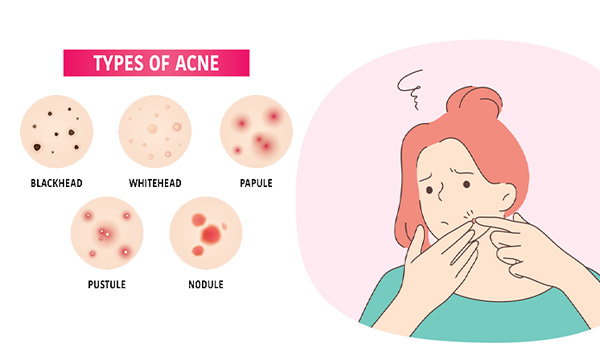You might be familiar with acne and its effects. Acnes can occur in different forms. Some might be hard; some might be pus-filled, some might be dark-colored, some might be red, etc. Each of these acnes has a different effect on your skin and must be treated accordingly. So, now let us discuss what acne is and the most common types of acne.
What is Acne?
Acne or Acne vulgaris is a condition of the skin caused by the clogging of skin pores by sebum (oil), dead skin cells, bacteria, and dust. Acne can result from an unbalanced diet, puberty, harsh atmosphere, genetics, stress, oil content, dandruff, skin abuse, etc. It can appear in several forms, from a tiny whitehead to noticeable pustules.
Types of acne
Acnes can be inflammatory, non-inflammatory, mild, moderated, and extremely severe. Some of the common types of acne and their treatment methods are given below.
- Whiteheads: Whiteheads or closed comedones are non-inflammatory acne. It is mainly formed by the clogging of skin pores with sebum and dead skin cells. The clogged pores usually close in the case of whiteheads, and they appear as slight bumps bulging out from the skin. It is usually seen on the chin, nose corners, and forehead in white or skin color. Treating whiteheads is a bit complicated because of the closed pores.
- Blackheads: Like whiteheads, blackheads are also non-inflammatory acne. Whiteheads are also known as open comedones because of opened pores. It is caused by the plugging of skin pores by sebum and dead skin cells. It appears as small black pimples protruding from the skin.
- Papules: Papules are the inflammatory type of acne. It is a result of the breakdown of walls surrounding your skin pores. It appears as small inflamed, red bumps on the skin. It is often painful, and touching or picking it can increase the inflammation and worsen the condition. Squeezing can also lead to acne scarring.
- Pustules: Pustules are another type of inflammatory acne which are mainly pus-filled. It is caused by the wall breakdown around your skin pores like in papules, but the difference is that pustules contain pus. It appears as red blemishes on the skin and has yellow or white covering or heads on its top. Picking of pustules can also lead to scarring.
- Nodules: Modules result from irritation and disturbance of the already clogged pore or acne. When sensitive acnes are poked or squeezed too hard, they can transform into hard, large, and deep-rooted nodules. A skin specialist or dermatologist must treat it because careless handling can lead to permanent scarring.
- Cysts: Cysts are pus-filled lesions caused by the plugging of pores with sebum, dead skin cells, and bacteria. It is filled with pus and is soft and sensitive touch. It usually looks similar to burns, and it is excruciating. It is always wise to visit a dermatologist to remove a cyst because unprofessional handling can lead to visible scarring.
- Acne Conglobata: It is the most manifestation form of acne. In this type of acne, nodules are connected to other nodules under the skin. It is mainly seen neck, arms, chest, and buttocks.
Treatment options for acne
Consulting a dermatologist is always the best option for acne. Because the careless and unprofessional handling of acnes can lead to painful, severe other conditions or visible scarring on the skin, once you consult a specialist, he or she will examine your skin and prescribe you medication for the issue. Some of the standard treatment methods for acne are:
- Topical therapy: Dermatologists usually prescribe topical acne solutions. It is applied directly on the skin like creams. Mild acne issues can be resolved with such medications. The standard contents of topical creams for acne are salicylic acid, sulfur, resorcinol, etc. Sometimes antibacterial or retinoid creams are also effective against acne.
- Systemic therapy: Severe acne conditions might require months of medication and therapy. This type of treatment is systemic therapy and includes oral contraceptives, vitamins, and different hormone pills to control the situation.
Limiting yourselves with a balanced diet, exercises, or reducing exposure to the sun can control or prevent acne to an extent. If the conditions get out of your hand, consult your dermatologist as soon as possible and start the treatment.
